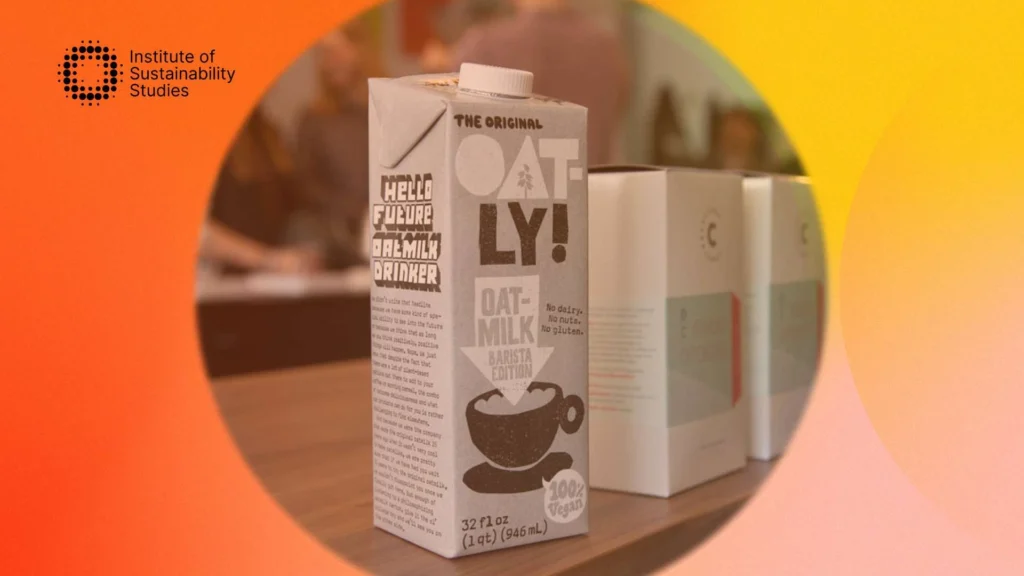Oatly has released a major update to its Global Sustainability Plan, reinforcing its position as a leader in climate-forward food systems. The brand also became the first food and drink company recognised as a Climate Solutions Company by the Exponential Roadmap Initiative (ERI). The new Oatly sustainability plan sets out tougher climate targets and wider ambitions across nature, nutrition, and people. It reflects a growing focus on real impact, not just measurement. Moreover, it highlights the role of sustainability education in building the internal knowledge needed to deliver lasting change.
A shift toward systemic impact
Oatly’s sustainability strategy now aligns with ERI’s climate solutions framework and the global Carbon Law, which supports halving emissions every decade in line with the Paris Agreement. The company has committed to reducing emissions intensity by 89 percent per litre of product by 2050, with interim targets of 40 percent by 2030 and 70 percent by 2040, all against a 2020 baseline.
Residual emissions will be addressed through durable carbon removals. What sets this plan apart is its system-level approach. Oatly is the first company to trial the “Spheres of Influence” model, a new framework co-developed with Futerra and Oxford Net Zero that measures and reports on a company’s influence beyond its direct operations. This includes societal shifts, such as encouraging consumers to transition from dairy to lower-emission alternatives.
Reduce costs and boost results with sustainability training built for business performance
Climate, nature, people, and nutrition
Oatly’s updated strategy integrates multiple dimensions of sustainability. In addition to emissions reductions, the company aims to:
- Transition to 100 percent renewable electricity and thermal energy by 2030
- Reduce water use to 2.2 litres per litre of product
- Source 100 percent recyclable or renewable packaging
- Implement regenerative agriculture practices across one-third of its oat supply
- Support at least 100 oat farmers in the transition to regenerative farming by 2030
- Maintain avoided emissions of 0.5kg CO₂e per litre sold, based on dairy replacement
The company is also taking steps to future-proof its business model by ensuring that by 2030, 90 percent of its revenue comes from products with at least 60 percent less climate impact than the average dairy product in each of its markets.
A model for climate leadership
Jean-Christophe Flatin, CEO of Oatly, emphasised the company’s commitment: “Our Plan acknowledges the deep interconnections between climate, nature, people and nutrition. We don’t have all the answers, but we’re committed to learning, sharing, and working with like-minded partners to build a food system fit for the future.”
Johan Falk, CEO of the Exponential Roadmap Initiative, added: “We are proud to recognise Oatly as a climate solutions company… helping shift industries onto a science-aligned path to net zero.”
Ultimately, the Oatly sustainability plan sets a new benchmark – combining bold climate targets with systemic action, equity, and resilience across its operations.
Conclusion
As ESG expectations evolve, Oatly’s move raises the bar for what sustainability leadership looks like. It’s shifting from focusing on internal footprints to influencing supply chains, consumer choices, and industry norms. By embedding education, innovation, and accountability into its business model, Oatly is shaping how brands can act as climate solutions in their own right.
For businesses, the takeaway is clear: sustainability ambition must be matched by internal capability. Book a call with one of our advisors to explore how our corporate sustainability training can help your organisation build the internal capability needed to meet growing ESG demands and turn pressure into performance.
Dedicated to harnessing the power of storytelling to raise awareness, demystify, and drive behavioural change, Bronagh works as the Communications & Content Manager at the Institute of Sustainability Studies. Alongside her work with ISS, Bronagh contributes articles to several news media publications on sustainability and mental health.
- Bronagh Loughlinhttps://instituteofsustainabilitystudies.com/insights/author/bronagh/
- Bronagh Loughlinhttps://instituteofsustainabilitystudies.com/insights/author/bronagh/
- Bronagh Loughlinhttps://instituteofsustainabilitystudies.com/insights/author/bronagh/
- Bronagh Loughlinhttps://instituteofsustainabilitystudies.com/insights/author/bronagh/











